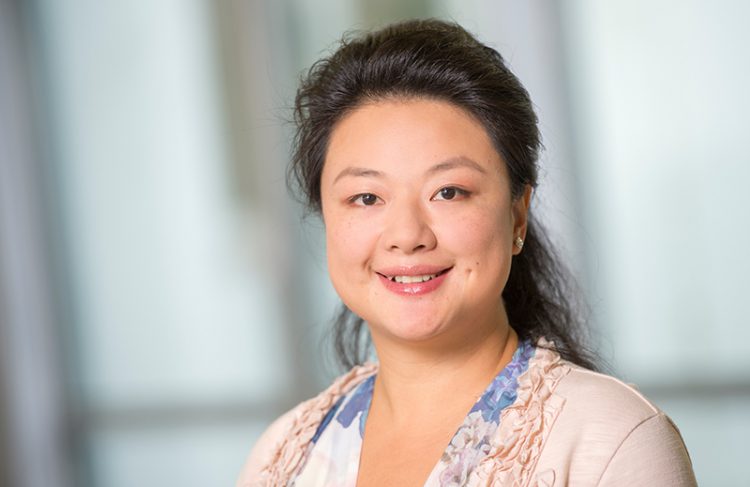Using viruses to fight resistant bacteria

Dr. Li Deng © Helmholtz Zentrum München
Emergence of antimicrobial resistance is a major threat to global health. Worldwide, more than 700,000 people died due to impaired action of antibiotic agents, and it is estimated to cause 10 million deaths a year by 2050.
Li Deng, head of an Emmy-Noether Young Investigator Group at the Institute of Virology of Helmholtz Zentrum München and junior fellow at the Technical University of Munich, aims to tackle this problem with a new approach. In the framework of the newly founded ERC project PHARMS (Bacteriophage inhibition of antibiotic-resistant pathogenic microbes and founding of novel therapeutic strategies), she plans to fight pathogenic bacteria with their natural enemies – the viruses.
To this end, she uses viruses which specifically attack bacteria, so called bacteriophages. “With our approach we use the viruses and phage-derived inhibitors as a natural way to fight antimicrobial resistance”, Li Deng explains.
“We hope that this might become a promising complement to antibiotics.” According to the scientist, the main obstacles in the clinical application of phage-based therapy are the limited number of phage isolates and the unknown molecular mechanisms of phage-delivered bactericidal action. “Moreover, we know too little about the mechanisms behind these bactericidal effects.”
Building on the recent advances of Deng’s group, PHARMS aims to deploy a systematic approach to identify the underlying mechanisms for phage inhibition of resistant bacteria strains. Based on this, the scientists aim to develop further phage derived therapeutic strategies.
Using an interdisciplinary research plan, PHARMS will discover phage-specific bactericidal action modes at all possible levels ranging from nucleotide sequence and transcription to translation, in order to elucidate the molecular mechanisms driving phage-mediated inhibition of antimicrobial resistance. One example of the respective bacteria is Helicobacter pylori which is often found in the stomach and linked to gastric ulcers and stomach cancer.
In the long run, the project is positioned to provide the rational framework for the design of novel therapeutic strategies aimed at treating common and life-threatening infectious diseases. “The rapid spread of antimicrobial resistance, and its devastating consequences for patients as well as healthy individuals, makes it one of the most important scientific challenges of our time”, Li Deng says. “Our work aims at making helpful contributions to society in this context.”
Further Information
The Helmholtz Zentrum München, the German Research Center for Environmental Health, pursues the goal of developing personalized medical approaches for the prevention and therapy of major common diseases such as diabetes and lung diseases. To achieve this, it investigates the interaction of genetics, environmental factors and lifestyle. The Helmholtz Zentrum München is headquartered in Neuherberg in the north of Munich and has about 2,300 staff members. It is a member of the Helmholtz Association, a community of 18 scientific-technical and medical-biological research centers with a total of about 37,000 staff members. http://www.helmholtz-muenchen.de/en
The Institute of Virology (VIRO) investigates viruses that chronically infect humans and can cause life-threatening diseases. The research activities of the institute focus mainly on the HI virus which causes AIDS, on endogenous retroviruses, which are integrated into our germline, and hepatitis B and C viruses, which cause liver cirrhosis and hepatocellular carcinoma. Molecular studies identify new diagnostic and therapeutic concepts to prevent and treat these viral diseases or to prevent the formation of virus-induced tumors. http://www.helmholtz-muenchen.de/viro
Contact for the media:
Department of Communication, Helmholtz Zentrum München – German Research Center for Environmental Health (GmbH), Ingolstädter Landstr. 1, 85764 Neuherberg – Tel. +49 89 3187-2238 – E-mail: presse@helmholtz-muenchen.de
Dr. Li Deng, Helmholtz Zentrum München – German Research Center for Environmental Health, Institute of Virology, Ingolstädter Landstr. 1, 85764 Neuherberg – Tel. +49 89 3187-49195 – E-mail: li.deng@helmholtz-muenchen.de
http://Please find a CV of Li Deng (https://www.helmholtz-muenchen.de/viro/institute/about-us/staff/staff/ma/6317/Dr…) as well as more information about research of her lab in the Institute of Virology on the Helmholtz Zentrum München website: https://www.helmholtz-muenchen.de/viro/research/emmy-noether-research-group-vira…
Media Contact
All latest news from the category: Life Sciences and Chemistry
Articles and reports from the Life Sciences and chemistry area deal with applied and basic research into modern biology, chemistry and human medicine.
Valuable information can be found on a range of life sciences fields including bacteriology, biochemistry, bionics, bioinformatics, biophysics, biotechnology, genetics, geobotany, human biology, marine biology, microbiology, molecular biology, cellular biology, zoology, bioinorganic chemistry, microchemistry and environmental chemistry.
Newest articles

First-of-its-kind study uses remote sensing to monitor plastic debris in rivers and lakes
Remote sensing creates a cost-effective solution to monitoring plastic pollution. A first-of-its-kind study from researchers at the University of Minnesota Twin Cities shows how remote sensing can help monitor and…

Laser-based artificial neuron mimics nerve cell functions at lightning speed
With a processing speed a billion times faster than nature, chip-based laser neuron could help advance AI tasks such as pattern recognition and sequence prediction. Researchers have developed a laser-based…

Optimising the processing of plastic waste
Just one look in the yellow bin reveals a colourful jumble of different types of plastic. However, the purer and more uniform plastic waste is, the easier it is to…



